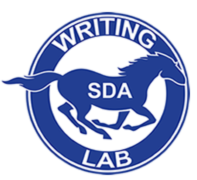Whoa! We just remembered a bunch of tips and suggestions, so here is a short list. Write back if you have any questions. If you do, then we’ll know what to explain in more detail.
–If 50% of writing is coming up with ideas and putting them down on the page, the other 50% is cutting things out. What you take out of your writing is often just as important as what you put in. Since we now have the magic of word processor programs, try saving your paper as a different version, and then experiment with taking things out. That way you can see how your paper will change after cutting, all without losing any of the work that you like. Often, after cutting sentences out, you’ll be pleasantly surprised to find your paper is actually a lot stronger.
–Write a lot, and then cut. Many students spend a lot of their time trying to get sentences perfect in their heads before writing them down. This eats up a lot of time because you end up with very little to work with and often can’t see what the ideas look like together until your paper is all done, and then it will take more drafts to refine your paper if it isn’t perfect. Rather than trying to get things perfect before writing a sentence, try the opposite: write down EVERYTHING that comes to mind, and don’t go back and edit any of it until all your ideas are out on the paper. For many, it’s a lot easier to select the best ideas from a full brainstorming sheet than it is to start with the first draft first. You might even find a better idea after brainstorming than you had to begin with.
–Not only is it helpful to have lots of ideas to choose from, but research papers are easier to write when you have a lot of information to work with. If you’re researching a topic, try printing out anything that is even remotely related. Once you have all of that information printed out, you can scan through the information and use a highlighter to select the best stuff. That way, you can come back to the highlighted parts later instead of having to re-read the whole article. And it’s always easier to have more information to analyze than you need rather than to try to wring more writing out of information you’ve already used up. Trust me; teachers can tell when a student is trying to stretch their information to avoid more research. It makes papers boring. REALLY boring. And no one likes that.
–With that being said, what do you do when you need more writing to reach a page limit, but you have used up all the information you’ve gathered and are having trouble finding more? Try expanding the scope of your paper. If you are writing about the foot, try switching to the leg. If you’re writing about what makes a planet a planet, try writing about what makes something not a planet. You can almost always look at the opposite of a scenario to compare and get more information. Try asking, “What would happen if it wasn’t this way?” Or look to the future. “What will things be like in fifty years? In 100?” Or the past. “How have things changed over the past few decades or centuries?” And if you can’t find any information, perhaps it’s time to change topics (although, sometimes writing a paper on why there’s no information about a certain subject can reveal just as much about that subject–maybe even enough for a paper).
This is getting long, so we’ll end this post and continue this discussion with another one.
